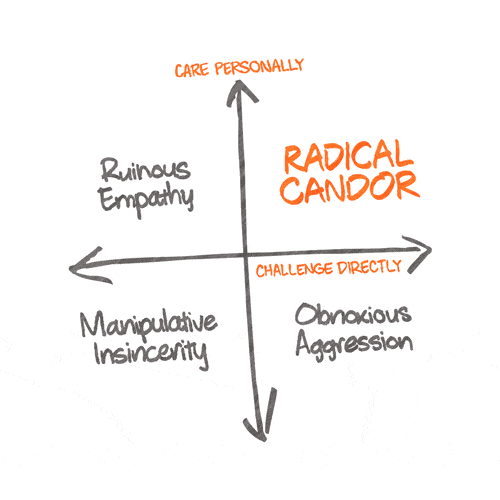RADICAL CANDOR
Simply put Radical Candor is when we care personally and challenge directly.
From a young age we were taught “If you don’t have anything nice to say, don’t say anything at all.” At the same time we were born with a capacity to connect and care for each other. Our training to “be professional” has made us repress our humanity in work contexts. As an ensemble member, it’s our job to challenge each other. We have to just say it!
OBNOXIOUS AGGRESSION
Connects to belittling, publicly embarrassing, or freezing out someone.
“Blaming people’s internal essence rather than their external behavior leaves no room for change” (26).
We must realize that it is kinder to be direct in the moment even if that causes some upsetedness.
RUINOUS EMPATHY
Most of us want to avoid creating tension or discomfort. We are like the well-meaning parent who can’t bear to discipline their kids.
We can’t have an environment where being nice is prioritized at the expense of critiquing and improving.
MANIPULATIVE INSINCERITY
Happens when we don’t care enough about a person to challenge them directly. People give praise and criticism that is manipulatively insincere when they are too focused on being liked or think they can gain some sort of political advantage by being fake--or when they are just too tired to care or argue anymore.
When you are overly worried about how people will perceive you, you’re less willing to say what needs to be said.
When you behave badly and get called out for it, an all-too-natural response is to become less genuine and more political--to move from obnoxious aggression to a worse place, manipulative insincerity.
A CULTURE OF PRAISE, CRITICISM, AND GUIDANCE
When giving praise, investigate until you really understand who did what and why it was great. Be specific and get into the details!
The best praise doesn’t just care for people personally, it challenges them directly because it tells folks what to keep doing.
When criticizing, try to be less nervous, and focus on just saying it. If we think too much about how to say it we’re likely to wimp out and say nothing.
When praising, try to be at least aware of how praise can go wrong, and put more energy into thinking about how to say it.
It’s easier to find fault IN a person than to look for the fault in the context of what they’re doing.
When concerned about moving down into obnoxious aggression, focus on caring personally.
The need for honest communication doesn’t always wait until you’ve built a close personal relationship...think of telling someone that their fly is down...just say it! The next time you spot a metaphorical fly that’s down and are tempted not to say anything, imagine where that puts you on the framework: Ruinous Empathy or Manipulative insincerity?
Oftentimes one of our concerns is what if I’m wrong? And the answer is we may very well be wrong! Giving criticism allows someone to correct your thinking on the issue which will ensure that equations are corrected.
When giving criticism or praise think about situation, behavior, impact and don’t personalize.
An essential part of us giving feedback to one another is doing it quickly! Quickly and informally is an essential part of radical candor...this takes discipline because of our natural inclination to delay/avoid confrontation and because we’re busy! Delay at your peril! Do it in 2-3 minute conversations right after the meeting or rehearsal or event has happened.
We want radical candor to be like brushing our teeth not like a root canal. Unspoken criticisms explode in ways that are harmful to relationships or makes you look irrational.
We must deliver praise and criticism in person as much as possible. One reason we try to avoid criticizing in person is because we don’t want to see someone else’s emotional reaction. When somebody is blowing off our criticism we need push down on the challenge directly line. When someone is getting upset or angry we need to push up on the care personally line.
Avoid the “fundamental attribution error” : this is when you use perceived personality traits (you’re stupid, lazy, greedy, hypocritical, an asshole etc.”) to explain someone else’s behavior rather than considering one’s own behavior and/or the situational factors that were probably the real cause of the other person’s behavior.

